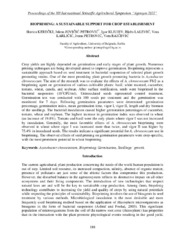Приказ основних података о документу
BIOPRIMING: A SUSTAINABLE SUPPORT FOR CROP ESTABLISHMENT
| dc.creator | Kerečki, Slavica | |
| dc.creator | Jovičić-Petrović, Jelena | |
| dc.creator | Kljujev, Igor | |
| dc.creator | Lalević, Blažo | |
| dc.creator | Karličič, Vera | |
| dc.creator | Petrović, Ivana | |
| dc.creator | Raičević, Vera | |
| dc.date.accessioned | 2023-12-08T11:33:04Z | |
| dc.date.available | 2023-12-08T11:33:04Z | |
| dc.date.issued | 2021 | |
| dc.identifier.isbn | 978-99976-787-9-9 | |
| dc.identifier.uri | https://agrosym.ues.rs.ba/article/showpdf/BOOK_OF_PROCEEDINGS_2021_FINAL.pdf | |
| dc.identifier.uri | http://aspace.agrif.bg.ac.rs/handle/123456789/6578 | |
| dc.description.abstract | Crop yields are highly depended on germination and early stages of plant growth. Numerous priming techniques are being developed aimed to improve germination. Biopriming represents a sustainable approach based on seed treatment in bacterial suspension of selected plant growth promoting strains. One of the most promising plant growth promoting bacteria is Azotobacter chroococcum. The aim of the research was to evaluate the effects of A. chroococcum F8/2 as a biopriming agent on germination of various cultivable plants: basil, white mustard, cucumber, tomato, wheat, canola, and soybean. After surface sterilization, seeds were bioprimed in the bacterial suspension (107CFU/ml). Uninoculated seeds represented control treatment. Germination test was conducted with 100 seeds per treatment and the germination was monitored for 7 days. Following germination parameters were determined: germination percentage, germination index, mean germination time, vigor I, vigor II, length and dry biomass of the seedlings. The bacterial inoculation caused higher germination percentages of cucumber, tomato, wheat and soybean. The highest increase in germination index was observed in wheat (an increase of 19.8%). Tomato and basil were the only plants where vigor I was not increased by inoculation. Generally, the most favorable effects of A. chroococcum biopriming were observed in wheat where vigor I was increased more than twice, and vigor II was higher by 75.4% in inoculated seeds. The results indicate a significant potential for A. chroococcum use in biopriming. The observed effects of seed priming on germination parameters were crop-specific, with the most prominent potential in wheat biopriming. | sr |
| dc.language.iso | en | sr |
| dc.publisher | University of East Sarajevo, Faculty of Agriculture, Republic of Srpska, Bosnia | sr |
| dc.publisher | University of Belgrade, Faculty of Agriculture, Serbia | sr |
| dc.publisher | Mediterranean Agronomic Institute of Bari (CIHEAM - IAMB) Italy | sr |
| dc.publisher | International Society of Environment and Rural Development, Japan | sr |
| dc.publisher | ... | sr |
| dc.relation | info:eu-repo/grantAgreement/MESTD/inst-2020/200116/RS// | sr |
| dc.rights | openAccess | sr |
| dc.rights.uri | https://creativecommons.org/licenses/by/4.0/ | |
| dc.source | Proceedings of the XII International Scientific Agricultural Symposium “Agrosym 2021” | sr |
| dc.subject | Azotobacter chroococcum | sr |
| dc.subject | Biopriming | sr |
| dc.subject | Germination | sr |
| dc.subject | Seedlings’ growth | sr |
| dc.title | BIOPRIMING: A SUSTAINABLE SUPPORT FOR CROP ESTABLISHMENT | sr |
| dc.type | conferenceObject | sr |
| dc.rights.license | BY | sr |
| dc.identifier.fulltext | http://aspace.agrif.bg.ac.rs/bitstream/id/25150/bitstream_25150.pdf | |
| dc.identifier.rcub | https://hdl.handle.net/21.15107/rcub_agrospace_6578 | |
| dc.type.version | publishedVersion | sr |


